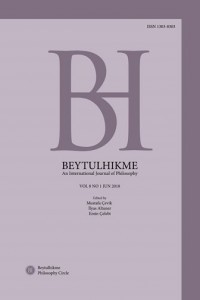Abstract
Foucault gives an account
of the contrast between Kantian and post-Kantian critique, which can be
summarized as a shift from universality to historicity. This shift to
historicity and contingency, for Foucault, opens up the possibility of
transgressive critical engagement whereby social transformation can take
place. In this essay, it is argued that Nietzsche’s work constitutes an
example of post-Kantian critique insofar as Nietzsche undertakes
critique in the form of revaluation of values through which the
historico-corporeal limits are exposed and ways to overcome them are
delineated. In this way, Nietzschean critique is an instance of will to
power inasmuch as it refers to an endless movement of overcoming.
Nietzsche thereby offers critique as a kind of symptomatology that is
tied to the corporeality of philosophy.
Keywords
References
- Butler, J. (2004). What is Critique? An Essay on Foucault’s Virtue. The Judith Butler Reader. (Eds. S. Salih & J. Butler). Malden, NJ: Blackwell Publishing, 302-22.
- Deleuze, G. (2006). Nietzsche and Philosophy. (Trans. H. Tomlinson). New York: Columbia University Press.
- Foucault, M. (1980). Nietzsche, Genealogy, History. Language, Counter-Memory, Practice: Selected Essays and Interviews. (Ed. D. F. Bouchard). Ithaca: Cornell University Press, 139-64.
- Foucault, M. (2010). What is Enlightenment? Foucault Reader. (Ed. P. Rabinow). New York: Vintage Books, 32-50.
- Marsden, J. (1998). Critical Incorporation: Nietzsche and Deleuze. Journal of Nietzsche Studies, 16, 33-48.
- Mellamphy, D. & Mellamphy, N. B. (2005). In ‘Descent’ Proposal: Pathologies of Embodiment in Nietzsche, Kafka, and Foucault. Foucault Studies, 3, 27-48.
- Nietzsche, F. (1968). Will to Power. (Trans. W. Kaufmann). New York: Vintage Books.
- Nietzsche, F. (1974). The Gay Science. (Trans. W. Kaufmann). New York: Vintage Books.
- Nietzsche, F. (1976a). The Twilight of the Idols. (Trans. W. Kaufmann). The Portable Nietzsche. (Ed. W. Kaufmann). London: Penguin Books.
- Nietzsche, F. (1976b). Thus Spoke Zarathustra. (Trans. W. Kaufmann). The Portable Nietzsche. (Ed. W. Kaufmann). London: Penguin Books.
- Nietzsche, F. (1989a). Beyond Good and Evil. (Trans. W. Kaufmann). New York: Vintage Books.
- Nietzsche, F. (1989b). Ecce Homo. (Trans. W. Kaufmann). On the Genealogy of Mor-als & Ecce Homo. (Ed. W. Kaufmann). New York: Vintage Books.
- Nietzsche, F. (1989c). On the Genealogy of Morals. (Trans. W. Kaufmann & R. J. Hollingdale). On the Genealogy of Morals & Ecce Homo. (Ed. W. Kaufmann). New York: Vintage Books.
- Vallega-Neu, D. (2006). The Bodily Dimension in Thinking. Albany: SUNY Press.
Abstract
References
- Butler, J. (2004). What is Critique? An Essay on Foucault’s Virtue. The Judith Butler Reader. (Eds. S. Salih & J. Butler). Malden, NJ: Blackwell Publishing, 302-22.
- Deleuze, G. (2006). Nietzsche and Philosophy. (Trans. H. Tomlinson). New York: Columbia University Press.
- Foucault, M. (1980). Nietzsche, Genealogy, History. Language, Counter-Memory, Practice: Selected Essays and Interviews. (Ed. D. F. Bouchard). Ithaca: Cornell University Press, 139-64.
- Foucault, M. (2010). What is Enlightenment? Foucault Reader. (Ed. P. Rabinow). New York: Vintage Books, 32-50.
- Marsden, J. (1998). Critical Incorporation: Nietzsche and Deleuze. Journal of Nietzsche Studies, 16, 33-48.
- Mellamphy, D. & Mellamphy, N. B. (2005). In ‘Descent’ Proposal: Pathologies of Embodiment in Nietzsche, Kafka, and Foucault. Foucault Studies, 3, 27-48.
- Nietzsche, F. (1968). Will to Power. (Trans. W. Kaufmann). New York: Vintage Books.
- Nietzsche, F. (1974). The Gay Science. (Trans. W. Kaufmann). New York: Vintage Books.
- Nietzsche, F. (1976a). The Twilight of the Idols. (Trans. W. Kaufmann). The Portable Nietzsche. (Ed. W. Kaufmann). London: Penguin Books.
- Nietzsche, F. (1976b). Thus Spoke Zarathustra. (Trans. W. Kaufmann). The Portable Nietzsche. (Ed. W. Kaufmann). London: Penguin Books.
- Nietzsche, F. (1989a). Beyond Good and Evil. (Trans. W. Kaufmann). New York: Vintage Books.
- Nietzsche, F. (1989b). Ecce Homo. (Trans. W. Kaufmann). On the Genealogy of Mor-als & Ecce Homo. (Ed. W. Kaufmann). New York: Vintage Books.
- Nietzsche, F. (1989c). On the Genealogy of Morals. (Trans. W. Kaufmann & R. J. Hollingdale). On the Genealogy of Morals & Ecce Homo. (Ed. W. Kaufmann). New York: Vintage Books.
- Vallega-Neu, D. (2006). The Bodily Dimension in Thinking. Albany: SUNY Press.
Details
| Primary Language | English |
|---|---|
| Subjects | Philosophy |
| Journal Section | Articles |
| Authors | |
| Publication Date | July 21, 2018 |
| Published in Issue | Year 2018 Volume: 8 Issue: 1 |


